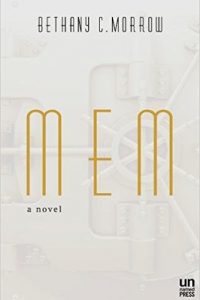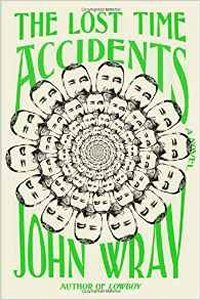Paul Di Filippo reviews Judd Trichter
The immediate instinct of all veteran SF readers—and veteran fans of SF cinema—will be to compare Judd Trichter’s debut novel to Blade Runner and Spielberg’s A.I. Artificial Intelligence. And those first critical impulses would be correct. Subsequent comparative thought might ring in Richard Calder and his Dead Girls trilogy, and this perception would fit the novel accurately as well. Finally, echoes of Richard Morgan’s Altered Carbon might resound in the ears of sensitive readers.
But these ranging shots would fail to capture the book’s unique voice, and also fail to pinpoint an important extra-literary influence on the story—for it is no mere “book compounded of other books”—and that tributary would consist of recent topical headlines and controversies. With its portrait of a collapsing, jury-rigged, inequitable infrastructure and economy; a human species that is its own worst enemy, unable to muster up the vision or will to change its bad habits; and the rampant spread of prejudice, hostility, inequality and lack of compassion, Trichter’s book takes the pulse and temperature of our global civilization circa 2015 and finds the patient nearly terminal. Black and despairing as those literary models cited above once appeared, they are Pollyanna visions compared to Trichter’s cynical diagnosis and nasty portrait. Are things really this messed up? Your mileage may vary, as the saying goes. But it’s a testament to Trichter’s skills that at least for the duration of the book—as with Orwell or Huxley—you believe they are.
The milieu is Los Angeles in the “late twenty-first century.” (And that vivid setting slots the book comfortably into another category, “great literature about L.A.”) Our protagonist is one Eliot Lazar (and please recall that “lazar” is an archaic synonym for “leper”), who is a salesman at a company that makes and sells androids for various commercial purposes. These artificial humans—dubbed “spinners” for their onboard vaguely gyroscopic power plants—are indistinguishable at a distance from the “heartbeats” or humans. Seemingly fully sentient—although their free will and depth of feelings remain debatable (as is also the case with humans, ironically)—they are generally considered property or slaves, except when manumitted. But even then, they remain second-class citizens, unprotected and preyed-upon.
Eliot has had the fortune—or misfortune—to fall in love with a spinner, Iris Matsuo, who returns his devotion. With spinner-heartbeat miscegenation constituting a low-level, generally unpunished crime, but also a slap in the face to many bigots, a social offense that enrages and leads to assaults, the pair have their hearts set on travelling to the pirate nation of Avernus, where no such prejudices exist. But before they can make their getaway, tragedy strikes. Iris is kidnapped and broken up for parts. The novel becomes Eliot’s quest—quixotic, fevered, dangerous, obsessional—to reassemble her, and thus awaken her “soul” once more. This odyssey will take him across every stratum of society, from industrial plants to the HQ of the spinner terrorist, Lorca.
A writer from outside the genre confines, Trichter nonetheless possesses the full suite of stefnal tools and paradigms and thought habits that define a great SF writer. He’s even as easygoing with a necessary infodump as Kim Stanley Robinson. The implications of his one simple conceit—androids—have been allowed to permeate every interstice of his future, from economics to culture, from art to crime, from sexual mores to child-raising. And it all hangs together organically.
Moreover, Trichter is not remiss in his homages. Asimov and Dick being primary influences, Pohl and Kornbluth also come into play, especially in the description of how androids were engineered to be pre-hooked on caffeine and cigarettes. There’s also, I think, a great riff on Lang’s Metropolis, with Iris being the female robot Maria. The city of Heron, California, where the android industry began, is described thus: “The Heron of today, however, rises conspicuously like some Gehry-esque volcano belching black smoke into the clouds. Its towering clusters are as recognizable as the Hollywood sign and can be seen from any point in L.A., and though few heartbeats ever set foot into the city itself, all of the world is familiar with the orgy of production that grows Heron every day like a tumor on the California spine.”
Another excellent thread and character is found in the figure of “the old detective,” who functions like Inspector Javert from Les Misérables. Eliot’s mad quest to reassemble Iris involves a lot of drug-addled violence (Eliot is addicted to drip, a drug created by androids out of “old plastic”), even unto murder, and the police naturally get involved. As a voice of humanistic reasoning and sentiment, the best parts of a vanished era, the old detective serves as a kind of moral counterweight to Eliot’s actions, a selfless corrective to the younger man’s egocentric manias.
But of course Eliot can be somewhat excused for his manias. His father was a kind of Howard Stark figure, the inventor of androids, and murdered by his creations in the presence of a teenaged Eliot. This of course makes Eliot Iron Man, and indeed, he has a cyborg arm as token of his interface between the two realms of heartbeats and spinners.
Trichter’s noirish dystopia is hallucinogenic naturalism, a prickly, disturbing descent into a world where only love—carnal or positronic—can offer a shelter from the artificial storms.








